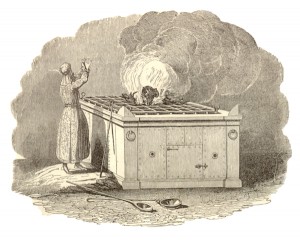 Over the next few weeks I’m going to explore the subject of Bible prophecy and its relationship to the Bible’s holy festivals and their related sacrificial service as described in the Torah (law). Seeing the subject through this contextual lens, I believe, will give you a new appreciation for the beauty and congruency of YHWH’s redemptive plan for mankind (it has for me).
Over the next few weeks I’m going to explore the subject of Bible prophecy and its relationship to the Bible’s holy festivals and their related sacrificial service as described in the Torah (law). Seeing the subject through this contextual lens, I believe, will give you a new appreciation for the beauty and congruency of YHWH’s redemptive plan for mankind (it has for me).
In this series, I hope to show you, there is more to the sacrificial symbolism of the Bible than most have understood and that symbolism points us to the inescapable conclusions that Yeshua (Jesus) is the Messiah promised in the Scripture.
We will start this series by looking at the significance of Yeshua’s fulfillment of the Bible’s holydays. We’ll then dig below the surface to show how these holydays and their associated sacrificial rites provide us with an amazingly congruent picture of the Messiah’s redemptive mission. Finally, in Part III will take that symbolism, shadow, and type and show why it is an integral part of Daniel’s 70 Weeks, the only prophecy in the Bible which gives a specific date for the coming of the Messiah Yeshua.
Bible Prophecy and the Law of Moses
Part I – The Bible’s Holy Days: Pictures of the Messiah
Part II (a) – The Messiah Factors: Numerical Evidence of Yahweh’s Redemptive Plan
Part II (b) – The Messiah Factors: Numerical Evidence of Yahweh’s Redemptive Plan
Part III – Seven, 70, & Sevens: Daniel 9 & the Bible’s Messianic Symbolism
So without further introduction, here is Part I in my exploration of Bible Prophecy and the Law of Moses:
The Bible’s Holy Days: Pictures of the Messiah
Did Yeshua (Jesus) fulfill the law? This is one of the most controversial questions of the church age. Interestingly, both extremes of this discussion often point to the following words of Yeshua as evidence for their position.
Think not that I am come to destroy the law, or the prophets: I am not come to destroy, but to fulfil [pleroo]. 18 For verily I say unto you, Till heaven and earth pass, one jot or one tittle shall in no wise pass from the law, till all be fulfilled. (Matthew 5:17-18)
One extreme says that Yeshua’s death and resurrection fulfilled all the law so that now the church is under a period of grace where no law applies. The other extreme of the argument says that all the law and the prophets have not yet been fulfilled, so the church is still under all 613 commandments of the law.
What if both side are looking at the subject from the wrong perspective?
You see, in that passage the word “fulfill” comes from the Greek word pleroo and it means to make full or to fill up. If you’re trying to understand this passage as it relates to the moral precepts of the Old Testament; it really doesn’t make much sense. But on the other hand if you look at the references below you’ll see that this word is most often used in the New Testament in reference to Yeshua fulfilling the prophecies written about Him in the Scripture. That makes much more sense. Take a look for yourself:
Matt 1:22; 2:15, 17, 23; 3:15; 4:14; 5:17; 8:17; 12:17; 13:35, 48; 21:4; 23:32; 26:54, 56; 27:9; Mark 1:15; 14:49; 15:28; Luke 1:20; 2:40; 3:5; 4:21; 7:1; 9:31; 21:24; 22:16; 24:44; John 3:29; 7:8; 12:3, 38; 13:18; 15:11, 25; 16:6, 24; 17:12f; 18:9, 32; 19:24, 36; Acts 1:16; 2:2, 28; 3:18; 5:3, 28; 7:23, 30; 9:23; 12:25; 13:25, 27, 52; 14:26; 19:21; 24:27; Rom 1:29; 8:4; 13:8; 15:13f, 19; 2 Cor 7:4; 10:6; Gal 5:14; Eph 1:23; 3:19; 4:10; 5:18; Phil 1:11; 2:2; 4:18f; Col 1:9, 25; 2:10; 4:12, 17; 2 Thess 1:11; 2 Tim 1:4; Jas 2:23; 1 John 1:4; 2 John 1:12; Rev 3:2; 6:11
But you don’t have to be a Greek scholar to understand the context of Yeshua’s statement because in Luke 24 he states it rather clearly:
And beginning at Moses and all the prophets, he expounded unto them in all the scriptures the things concerning himself… (Luke 24:27)
And he said unto them, These are the words which I spake unto you, while I was yet with you, that all things must be fulfilled [pleroo], which were written in the law of Moses, and in the prophets, and in the psalms, concerning me. (Luke 24:44)
Based on the context provided, Yeshua’s statement about fulfilling the law and prophets is not a statement about the validity of the law as continuing moral precepts in regards to the Jewish people (even though the religious leaders had been accusing Him of questioning this) but rather a statement that He was the ultimate fulfillment of the Bible’s prophecies found in the Law (1st five books of Moses), the prophets, and the Psalms. In other words, Yeshua is telling his brethren that YHWH’s Salvation, His Yeshua, is the underlying story of the Old Testament, or in the words of Revelation 19:10, Yeshua is the spirit of prophecy!
So let’s explore the law and the prophets and see how they describe YHWH’s Salvation for mankind.
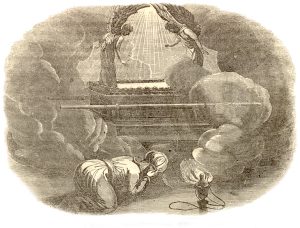 The Patterns of Temple Service
The Patterns of Temple Service
To start with, let’s look at how the author of Hebrews explained an aspect of Yeshua’s fulfilling the “law” in Hebrews 9 & 10. In the following passage the author shows how the sacrificial system was but a shadow or type that was fulfilled in Yeshua.
For when Moses had spoken every precept to all the people according to the law, he took the blood of calves and of goats, with water, and scarlet wool, and hyssop, and sprinkled both the book, and all the people, Saying, This is the blood of the testament which God hath enjoined unto you. Moreover he sprinkled with blood both the tabernacle, and all the vessels of the ministry. And almost all things are by the law purged with blood; and without shedding of blood is no remission.
It was therefore necessary that the patterns of things in the heavens should be purified with these; but the heavenly things themselves with better sacrifices than these. For Christ is not entered into the holy places made with hands, which are the figures of the true; but into heaven itself, now to appear in the presence of God for us:…
So Christ was once offered to bear the sins of many; and unto them that look for him shall he appear the second time without sin unto salvation.
For the law having a shadow of good things to come, and not the very image of the things, can never with those sacrifices which they offered year by year continually make the comers thereunto perfect…
But in those sacrifices there is a remembrance again made of sins every year. For it is not possible that the blood of bulls and of goats should take away sins…
Above when he said, Sacrifice and offering and burnt offerings and offering for sin thou wouldest not, neither hadst pleasure therein; which are offered by the law; Then said he, Lo, I come to do thy will, O God. He taketh away the first, that he may establish the second. By the which will we are sanctified through the offering of the body of Jesus Christ once for all.
And every priest standeth daily ministering and offering oftentimes the same sacrifices, which can never take away sins: But this man, after he had offered one sacrifice for sins for ever, sat down on the right hand of God; From henceforth expecting till his enemies be made his footstool.
14 For by one offering he hath perfected for ever them that are sanctified. (Hebrews 9:19 – 10:14) (exerpted)
As you see from this passage the author of Hebrews saw the sacrificial service of the law as but a prophecy (shadow) which points the Jewish people (the Hebrews) to the atoning work of Yeshua at Calvary.
John the Baptist also understood that Yeshua was a type or shadow of the sacrificial service required in the Torah. In John 1 he affirmed this twice.
The next day John seeth Jesus coming unto him, and saith, Behold the Lamb of God, which taketh away the sin of the world. (John 1:29)
Again the next day after John stood, and two of his disciples; And looking upon Jesus as he walked, he saith, Behold the Lamb of God! (John 1:35-36)
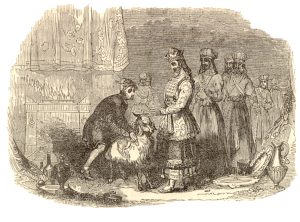 Remembering Yeshua as our Passover
Remembering Yeshua as our Passover
Did you know that the Apostle Paul encouraged the Corinthians to keep the Passover as a symbol of Christ’s fulfillment of the law? In the following verse Paul exhorts the church at Corinth to keep the “feast” and to remember that “Christ our Passover was sacrificed for us”. This aspect of the law, instead of being done away with, was kept by the Gentile church of Corinth as a remembrance or symbol of Yeshua’s fulfillment of those ancient instructions given to Moses.
Purge out therefore the old leaven, that ye may be a new lump, as ye are unleavened. For even Christ our passover is sacrificed for us:
Therefore let us keep the feast, not with old leaven, neither with the leaven of malice and wickedness; but with the unleavened bread of sincerity and truth. (1 Corinthians 5:7-8)
An Offering and a Sacrifice
To the Ephesians Paul described Yeshua as both an offering and a sacrifice. Again this is a picture of Yeshua fulfilling the sacrificial service of the “law”.
And walk in love, as Christ also hath loved us, and hath given himself for us an offering and a sacrifice to God for a sweetsmelling savour. (Ephesians 5:2)
Yeshua as the First Fruits of the Harvest
Some of you may not be familiar with the fact, but the law of Moses required Israel to keep a special feast day where the first fruits of their harvest where offered to YHWH. This Biblical feast day was rather unique because its celebration was connected to a 50 day countdown which began on the 1st day of the week following the first Sabbath after the Passover. Did you know that the apostle Paul in his epistle to the Corinthians described Yeshua in terms of this “firstfuits” celebration?
It is also worth noting that the Torah describes this feast of Firstfruits as being celebrated after the “weeks” (sevens / Shabuwa) had been accomplished. Daniel 9:25 confirms the Messianic nature of this passage by telling the Jewish people that a Messiah would indeed come after 70 Shabuwa’ (sevens) had been fulfilled.
Also in the day of the firstfruits, when ye bring a new meat offering unto YHWH, after your weeks [shabuwa’] be out, ye shall have an holy convocation; ye shall do no servile work: (Numbers 28:26)
Know therefore and understand, that from the going forth of the commandment to restore and to build Jerusalem unto the Messiah the Prince shall be seven weeks [shabuwa’] ,… (Daniel 9:25
But now is Christ risen from the dead, and become the firstfruits of them that slept. 1 Corinthians 15:20)
The Lamb Slain from the Foundation of the World
In last my last article Did the Apostle Peter Believe in the Imminence of Christ Return we explored the epistles of Peter and their context as letters of encouragement to the Jewish people in the last days before Christ’s return. Notice in the following passage taken from Peter’s epistle that Peter describes Yeshua in terms of the Torah’s sacrificial symbolism. Worth noting also is that Peter tells his readers that Yeshua, as the sacrificial lamb, was part of YHWH’s redemptive plan for mankind which He, the living God of the Bible, established “before the foundation of the world.”
But with the precious blood of Christ, as of a lamb without blemish and without spot: Who verily was foreordained before the foundation of the world, but was manifest in these last times for you,… 1 (Peter 1:19-20)
Your lamb shall be without blemish, a male of the first year: ye shall take it out from the sheep, or from the goats: And ye shall keep it up until the fourteenth day of the same month: and the whole assembly of the congregation of Israel shall kill it in the evening. (Exodus 12:5-6)
The Sacrificial Lamb of Revelation
Finally, I would be negligent if I did not mention the revelation given to the Apostle John where Yeshua is described as “lion of the tribe of Juda, the Root of David” and a “Lamb as it had been slain.”
And one of the elders saith unto me, Weep not: behold, the Lion of the tribe of Juda, the Root of David, hath prevailed to open the book, and to loose the seven seals thereof.
And I beheld, and, lo, in the midst of the throne and of the four beasts, and in the midst of the elders, stood a Lamb as it had been slain, having seven horns and seven eyes, which are the seven Spirits of God sent forth into all the earth. (Revelation 5:5-6)
Yeshua Fulfilled the Law
As you can see from these passages Yeshua Himself and the New Testament apostles saw the law of Moses as it related to the Biblical holydays as shadows, types, or symbols, in short – prophecies – which where fulfilled in Yeshua. They understood that this Torah ( law) was a terrible bloody remainder of the consequence of sin and the necessity for atonement for that sin.
For those not familiar with the Old Testament, the symbolism, shadow, and type we explored above is centered around seven yearly holydays which Israel was required (by the law) to keep every year. Those holydays where organized into spring holydays (Passover, Unleavened Bread, First Fruits) during the first month, and fall festivals (the Feasts of Trumpets, Atonement, and Tabernacles) during the 7th month.
The Sacrificial Symbolism of the Bible’s Holydays
But how far can we take this prophetic metaphor and symbolism of the sacrificial service found in the Torah? What about the number and order of the sacrifices themselves? Are they too a prophetic shadow or type which tells us of Yeshua’s redemptive mission?
In my next article we’ll explore this fascinating aspect of the Biblical feast days as they related to the Bible’s sacrificial symbolism and a promised Messianic redeemer. What we’ll discover is the astounding prophetic congruency of the Bible’s sacrificial service in that it points specifically to a single individual in the history of the world as the Bible’s promised Messiah.
In closing I leave you with a series of charts showing the sacrifices required during the 7 yearly Biblical holy days. I challenge you to see if anything unusual stands out to you. In my next article we’ll explore why YHWH might have given such unusual instructions to Israel and why they too point us to the Messiah and His redemptive purpose for mankind.
For the law having a shadow of good things to come, and not the very image of the things, can never with those sacrifices which they offered year by year continually make the comers thereunto perfect. (Hebrews 10:1)
Bible Prophecy and the Law of Moses
Part I – The Bible’s Holy Days: Pictures of the Messiah
Part II (a) – The Messiah Factors: Numerical Evidence of Yahweh’s Redemptive Plan
Part II (b) – The Messiah Factors: Numerical Evidence of Yahweh’s Redemptive Plan
Part III – Seven, 70, & Sevens: Daniel 9 & the Bible’s Messianic Symbolism
FREE Book Download:
If you are interested in Biblical history and Bible prophecy, you might also appreciate my books in the Prophecies and Patterns series.
At the following link you may download one of the three books shown below. If you like the book and would like to download the other two, all I ask is that you subscribe to my blog: The 13th Enumeration – where history and the Bible meet with evidence for the promised Messiah Yeshua (Jesus).
Rest assured I won’t share your email or spam you with advertisements or other requests. Just every couple of weeks I’ll share with you my love of Biblical history and Bible Prophecy. Should you decide you no longer wish to be a subscriber you can unsubscribe at any time.
Click the following link to download your Free book: Book Download
I hope you’ll join the adventure!
[DISPLAY_ULTIMATE_PLUS]
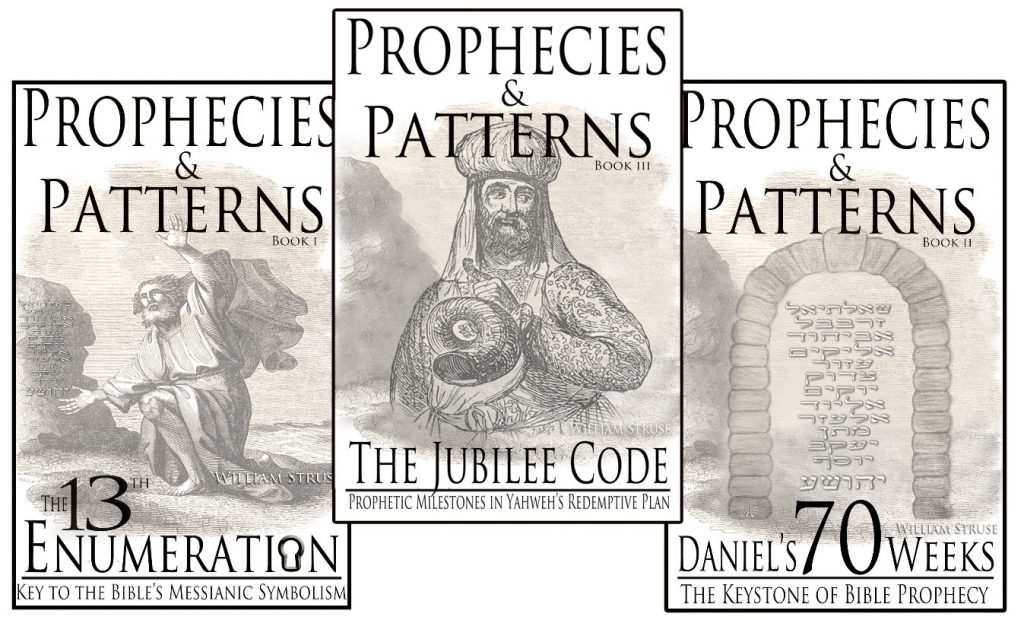

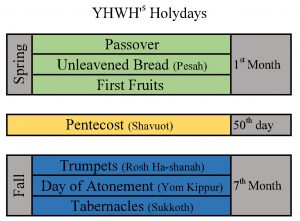

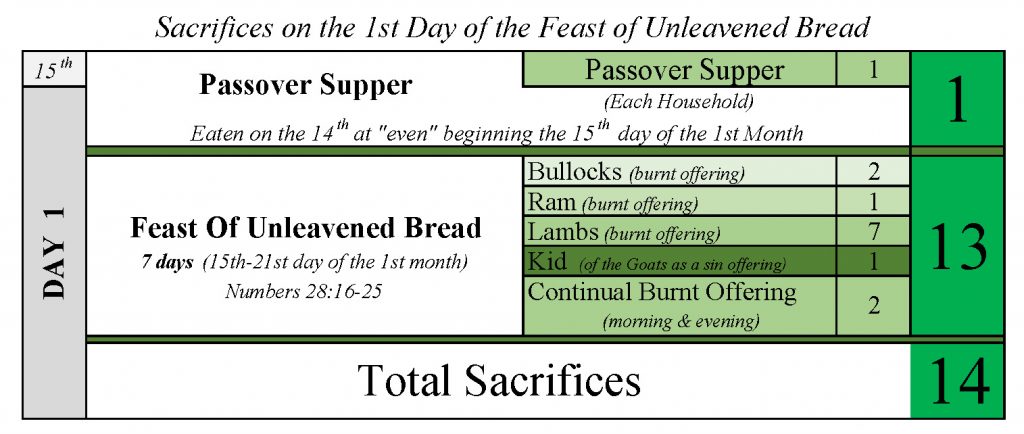







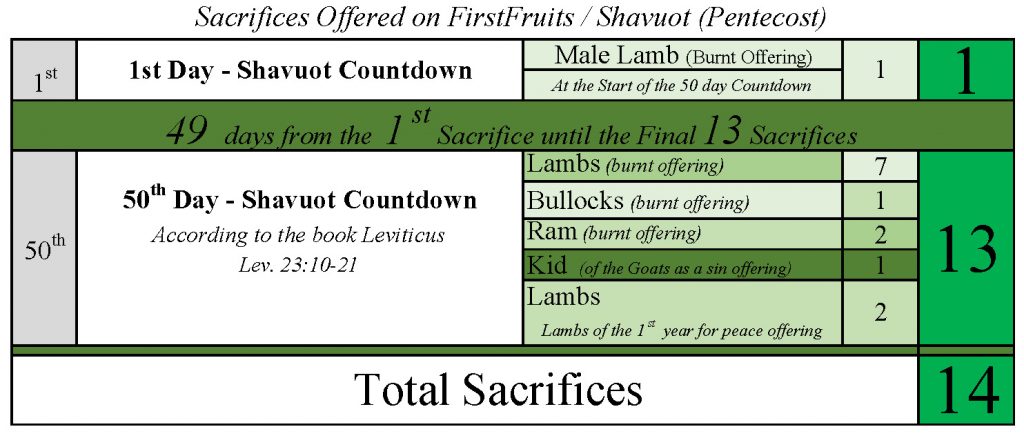
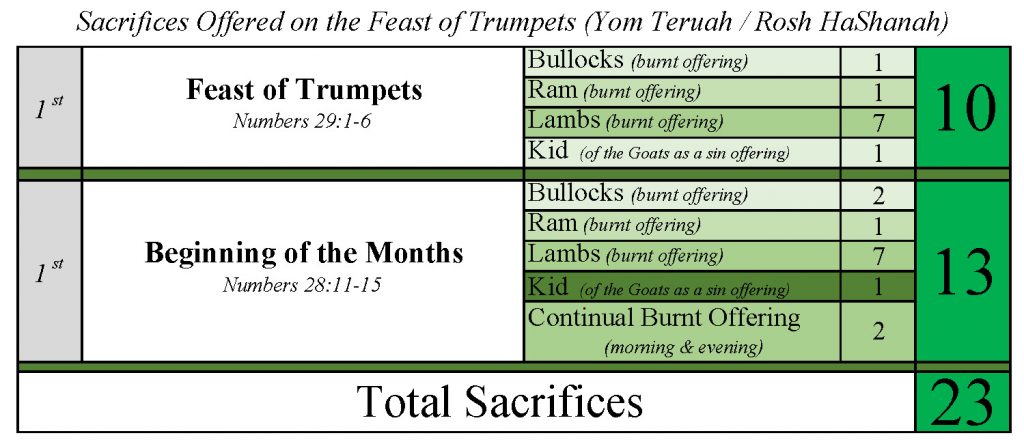

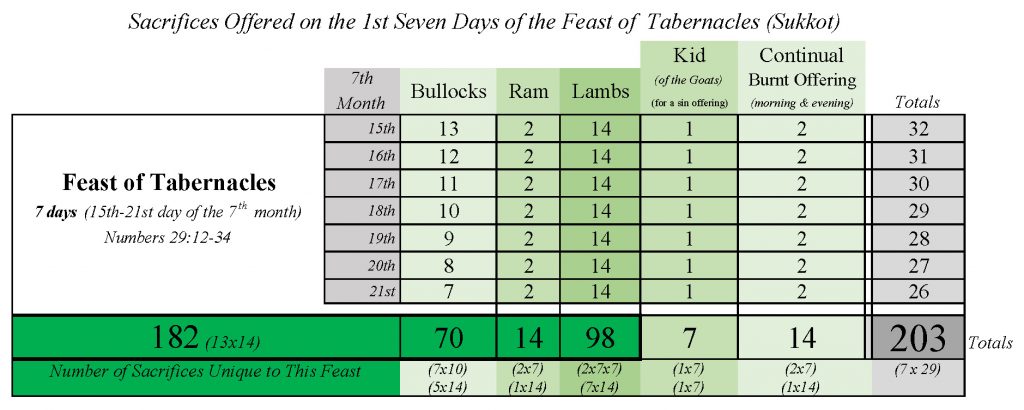

I appreciate your many hours in study and research. I can be lengthy here, but I won’t. You need to reconsider your writings and understanding on the firstfruits of the barley wave sheaf offering. A concerted and diligent study will reveal to you by the Holy Spirit, that the day of the wave sheaf offering is NOT a feast day, NOT an intermediate day during a feast week either. This is a key that will unlock many mysteries heretofore little known. It also is of utmost importance with regard to the coming Passover season this next spring. Should you choose to discuss it, I can with brief communications as lengthy ones make for difficulty in comprehension. Suffice to say, the day of the wave sheaf of the firstfruits is not the day Yeshua rose from the dead, and many, in a fanciful imaging of this have gotten it wrong. He rose the third day, according to the Scriptures, and it means, OF THE WEEK.
Good morning William,
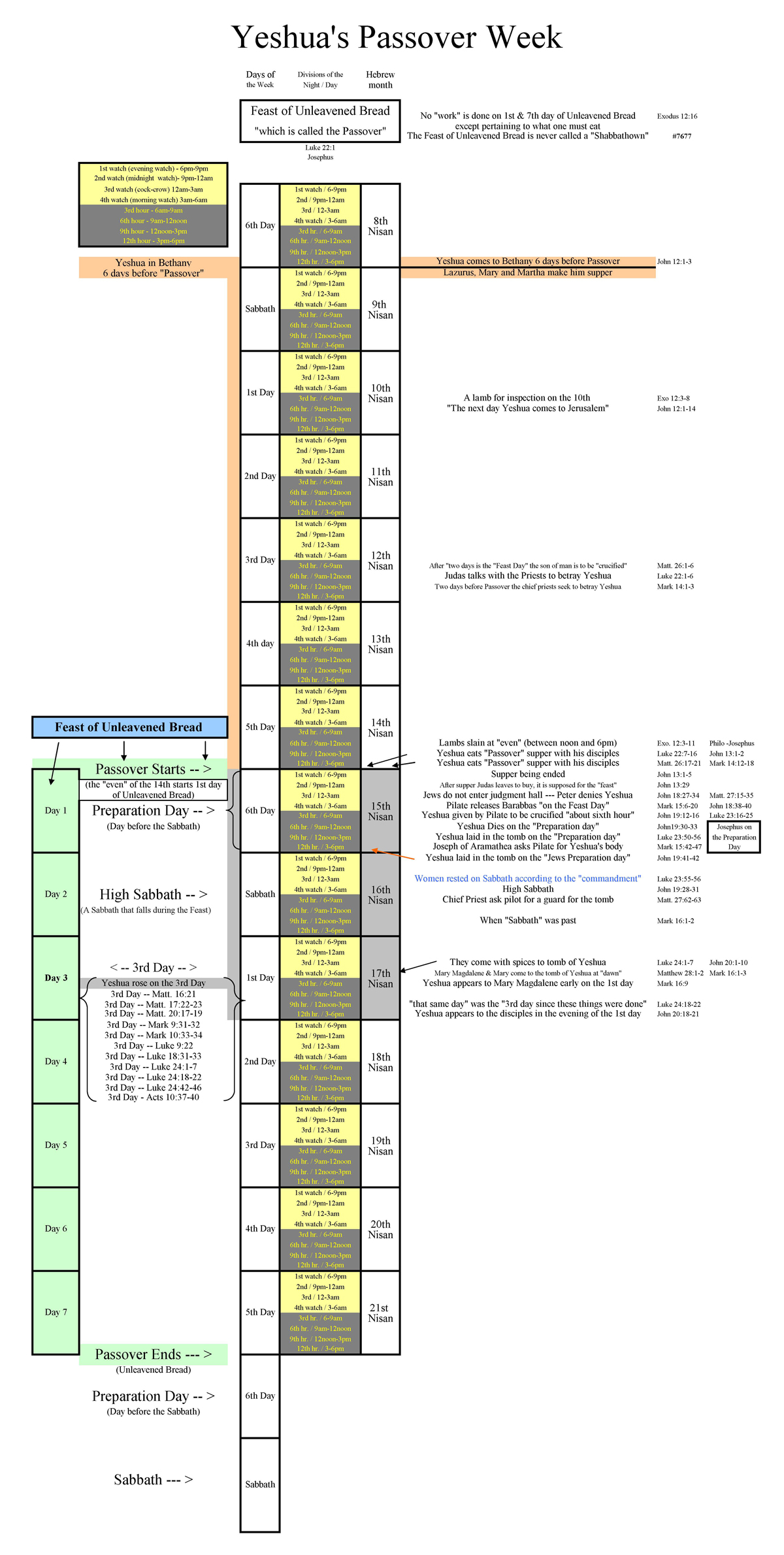
You are welcome to share your thoughts on the subject, I’d love to hear them. Feel free to post them here if you would like. You could also add them to one of my posts on the subject here.
Warm regards,
William